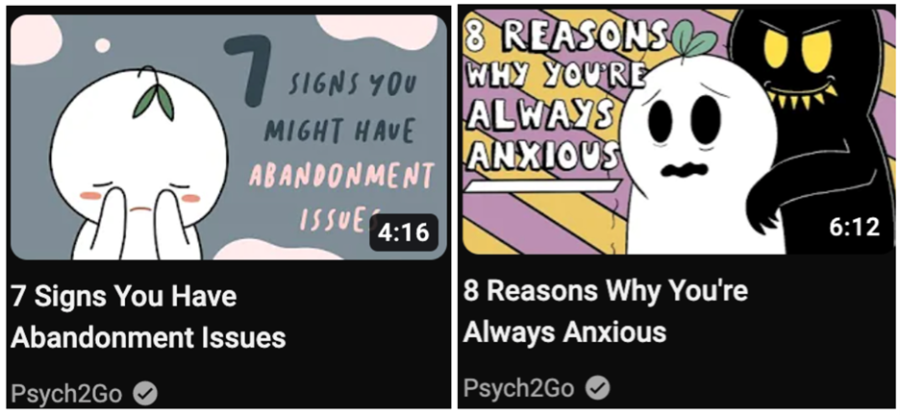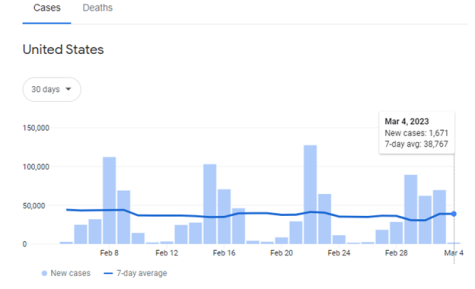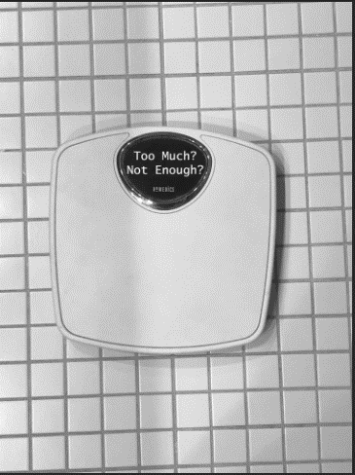Social media is not a licensed therapist
Photo courtesy of Psych2Go on YouTube
Though online resources such as the YouTube channel Psych2Go offer a starting point for those unsure how to recognize mental illness, it cannot be relied upon to officially diagnose or treat individuals. Instead, please reach out to professionals through the school or healthcare providers.
While Generation Z is productive in creating open discourse surrounding mental health and advocating for mental health awareness, there are unavoidable downsides to the increase in such conversations. For one, the glamorization of certain mental illnesses and neurodivergent conditions has become apparent.
“Mental health and mental illness are more openly talked about, but the flip side is that now it’s kind of trendy to say, ‘Well, I have an anxiety disorder, I have [obsessive compulsive disorder (OCD)],’ or that sort of thing. When people say they have OCD but don’t just because they think it’s neat, they over-self-diagnose,” said clinical social worker Cynthia Crisafulli.
Social media often leads teens to incorrectly self-diagnose, which can minimize the experiences of those who actually deal with certain conditions. By wanting to appear trendy, the realities of mental health issues become overshadowed by the glamorization of these conditions as an aesthetic for social media.
“Certain conditions are demonized compared to others [on social media]. For one, schizophrenia is demonized and misunderstood in general. Depression is romanticized because it’s seen as you’re very sad and moody, but that’s not quite always it. There are other symptoms at play, like lethargy and apathy, and there’s a lot more density. You’re treated a lot differently; for example, someone with anxiety is not going to be demonized the same way as someone with schizophrenia,” said junior Alex Sigurdson.
From Sigurdson’s perspective, society views surface-level symptoms as more acceptable and, in a sense, has twisted them to become desirable. That is why people are quick to claim they have anxiety because they get nervous once in a while or have attention-deficit/hyperactivity disorder (ADHD) because they procrastinate sometimes.
However, people who notice continuous symptoms that correlate with such conditions may be reluctant to seek professional help. Instead, the internet is an open and free resource that is accessible, which in turn becomes a readily available pseudo-therapist for anyone to vent into the void. Social media is often the first place many teens may turn to if they believe they exhibit symptoms, but there are posts rampant with mistruths about mental health and encouragement of unhealthy behaviors.
“I worry quite a bit about students oversharing, particularly on social media, because you don’t know who will see that. Those personal things you experienced, those things you’re struggling with, aren’t meant to be shared with the whole world, right? But now people are just laying it all out there, and it kind of minimizes the true experience you’re having,” said Crisafulli “Some people enjoy the attention of saying, ‘Oh, my God, this horrible thing happened to me.’ I do think that [it’s] kind of maladaptive to want people to like you or pay attention to you just because you can share bad things that have happened to you or bad feelings that you’re having. Ultimately, it doesn’t serve people well even if it works in the short term.”
Though expressing emotions is an effective coping mechanism, according to Crisafulli, it can become harmful when done in a public space where everyone is free to assert their opinions and judgments. Of course, some may feel more comfortable relaying their feelings to strangers, but talking to others in real life is just as important.
“I have students who take quizzes online to diagnose themselves that way. I’m glad they’re doing that because they’re noticing that something is not quite right, that they’re not feeling well, and they’re taking steps to figure out what’s going on,” said Crisafulli. “Then the next step they do is they come to me, a mental health professional, to get more information. So I talk with them more about what kind of symptoms they’re experiencing, how long they’ve been experiencing them, and how intense they’re experiencing those symptoms. Typically, with their permission, I’ll contact their parents and give them resources to help them find a therapist or psychiatrist.”
The FCPS website has a section dedicated to information about different school psychology services. Staff are given mental health training through the Youth Mental Health First Aid course so they can direct students to the right resources. Counselors, school social workers, or school psychologists can offer more in-depth information or access to a professional therapist. For students unable to afford mental health care, the Sharon Bulova Center for Community Health in Fairfax accepts students under 18 with Medicaid. Counselors can also help connect students with Short Term Behavioral Health, a program that offers free counseling to FCPS students based on income criteria.
Though the internet may be a temporary solution to discuss feelings and emotions, never listen to non-reputable sources for medical information. Always seek a professional opinion in regard to medication or dosage. For students in immediate crisis, please do not hesitate to call the suicide prevention hotline at 988 or text NEEDHELP to 85511.
“The best advice I’ve ever seen [for mental health] is to make life easier for yourself in whatever way, even if it feels like cheating or laziness. For example, you don’t need to fold your laundry away, just put it all in the basket and then take things out. It’s not a perfect solution, but it’s practical for when you’re struggling. If it works for you, it works.”
– Alex Sigurdson, 11th grade




